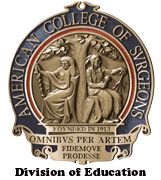Total Gastrectomy Extended to the Head of the Pancreas and Liver with D4 Lymphadenectomy for Well Differentiated Gastric Carcinoma
Ignazio M. Civello, MD, FACS, C. Nigro, MD, D. Matera, MD, F. Brandara, MD, F. Greco, MD, G. Brisinda, MD

| Product Details | |
| Product ID: | ACS-2258 |
| Year Produced: | 2003 |
| Length: | 10 min. |
Adenocarcinoma of the stomach is the second most common cancer worldwide. Early diagnosis and an adequate surgical approach could save lives. Surgical approach is conditioned by the extension of the disease and the presence of metastases. We present a case of a 52 year old female with epigastric pain for over two months associated with asthenia and weight loss. Physical examination of the abdomen revealed an epigastric mass. Esophagogastroduodenoscopy disclosed an ulcerative tumor of the antrum. Microscopic examination of gastric biopsy specimens revealed a picture of well differentiated gastric carcinoma. A CT scan of the abdomen showed a gastric mass of the antrum invading the head of the pancreas and the liver. Intraoperatively, we found an infiltration of the third segment of the liver. Thus, we performed an en bloc multiple organ resection consisting of atipical liver resection (IIIrd. segment), total gastrectomy associated with pancreaticoduodenectomy with fibrin glue occlusion of the main pancreatic duct and D4 lymphadenectomy. The D4 dissection included lymph-nodes along the stomach as well as nodes along the celiac, splenic and hepatic arteries plus nodes along the porta hepatis and along the aorta and vena cava as far as down the inferior mesenteric artery. Microscopic examination of all resected nodes documented an infiltration of one node of the lesser curve and one along the porta hepatis. The post-operative course was uneventful. The radiologic control demonstrated the absence of anastomotic leak. After follow-up period of 2 years and a chemotherapy treatment, the patient is alive with no signs of recurrence.



